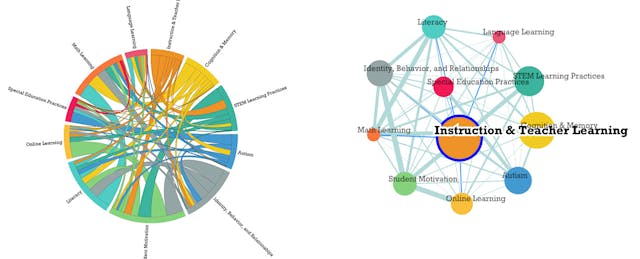Here’s a veritable treasure trove of available research on education tools and programs. Digital Promise has compiled a Research Map based on data from more than 100,000 articles published between 2007 and 2016.
The main topics are 1) instruction and teacher learning, 2) cognition and memory, 3) student motivation, 4) STEM learning practices, 5) online learning, 6) autism, 7) literacy, 8) special education practices, 9) identity, behavior and relationships, 10) language learning, and 11) math learning. Broken down even further, about 40 subtopics can be help users locate data.
The map helps educators, leaders, innovators and stakeholders quickly find education and learning science research results and reports. The structure of the map helps plot out how research topics connect to each other. It offers two unique visualizations (a “chord” and “network” view) plus a topic-based traditional list view to connect seekers with useful information. A tutorial decodes what the web of circles, chords and lines mean.
For another visual treat check out Digital Promise’s series of videos that demonstrate various learning science research principles.
Digital Promise also has what could become a teacher’s best friend—the Learnings Positioning Systems. It helps teachers dig into the research that shows what’s having the greatest impact on students’ learning, and it will help them discover strategies to make learning personal for all.
Additionally, Digital Promise wants to answer educators’ questions. Its “Ask a Researcher” feature makes it easy for educators to get trusted, research-based responses about real education challenges. Digital Promise collects questions from educators who are looking for new ways to support students in their classrooms. The answers to those questions, developed in partnership with Usable Knowledge at the Harvard Graduate School of Education, can provide the first steps for using research to improve student learning.


